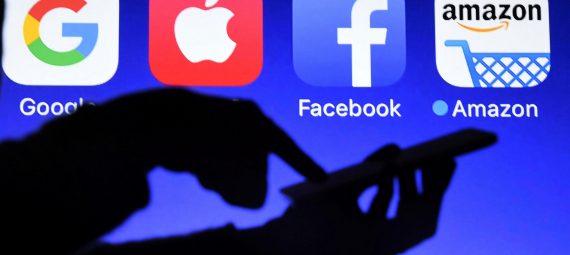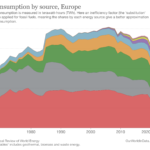JOHANNES EBER
This article was originally written for the “Good morning Europe” blog (www.goodmorningeurope.substack.com) by Johannes Eber. We were given permission to publish this article on the European Liberals for Reform blog.

What does our digital future look like? Will it be a good one? With almost infinite offers, with progress in all areas, with low prices because competition is dense? Or will a few monopolists dominate the market, with choices limited and costs high? At the moment, the latter seems more likely to be feared.
The tech giants Google, Apple, Facebook and Amazon – called GAFA – currently have a market capitalisation of more than 6 trillion euros, which is about five times as much as the entire German blue-chip stock market, called DAX.
According to Global Data, a data analytics and consulting company headquartered in London, the GAFA companies completed a total of 168 merger and acquisition deals between 2018 and 2020. With no end in sight.
Maybe never before, so few companies possessed so much power. With so much influence on our lives.And we are most likely still in the early phases of the digital revolution. Politicians are called upon to reverse the trend because it is possible that the market won’t fix it. Although digital market forces drive huge efficiency gains, they also can create winner-take-all dynamics. Because of network effects.
A network effect occurs when the value of a good or service increases the more people use it. Where there are many, it’s worth being there. In the end, all end up in one network. A monopoly is established.
Another reason for monopoly tendencies: Power over data.
In their “Competition policy: The challenge of digital markets“, the Monopolkommission – an expert committee which advises the German government and legislature in the areas of competition policy-making, competition law, and regulation – writes:
“The significance of (user) data is a key feature of digital markets and digital business models. Having control over and being able to analyse large volumes of data can be a crucial competitive advantage, particularly as such data are frequently in the exclusive possession of individual companies.”
Network effects and data power creates new challenges for regulators and antitrust authorities. The latest attempt to keep the tech giants in check: the Digital Markets Act, short DMA.
This week the European Parliament finally agreed on its position for the last leg of negotiations before the DMA is finally approved. The next EU presidency (France) has already stated its ambition to wrap up the negotiations in the first half of 2022.
What is the Digital Markets Act about?
It aims to force tech giants to change their business models and allow smaller rivals a more prominent role on their platforms instead of pushing the company’s own service and products. The legislation will apply to any company with a market capitalisation of at least 80 billion euros and offering at least one internet service.
The GAFA companies are alarmed.
A week after Google lost its appeal against a 2.42 billion euros antitrust fine, Google’s chief executive Sundar Pichai held a virtual meeting with EU competition and digital policy chief Margrethe Vestager. And by the end of this year, the company’s chief legal officer, Kent Walker, is expected to come to Brussels to speak to regulators and lawmakers.
Valentina Pop writes in the Financial Times’ daily Europe newsletter:
“The most pressing issue for Google doesn’t seem to revolve as much around past competition cases Vestager launched — though the company is still fighting those in EU courts — as it is about fresh legislation, particularly the Digital Markets Act, which is inching towards the final stages of negotiations after a deal in the European parliament last night.”
Google is right to be concerned. The law could be effective.
The current laws can only catch companies in the act, not ex-ante, which means before an event. The Digital Markets Act, however, focuses on ex-ante regulation. It allows regulators to address structural competition problems without finding an infringement of antitrust rules. It involves the application of strict, transparent rules to digital platforms before they engage in any anti-competitive behaviour.
Will the various legal measures in the end ensure more competition in the future? Since it is about the future we don’t know. Perhaps such regulations are not necessary at all.
Some think so.
Ryan Bourne, from the US-American libertarian think tank Cato writes in “Is This Time Different? Schumpeter, the Tech Giants, and Monopoly Fatalism“:
“Many economists, lawyers, and politicians say that economic features of these companies’ product markets – such as network effects, economies of scale, data collection, tying of complementary goods, or operating online marketplaces – create unfair competition or insurmountable entry barriers for new competitors. They conclude that ‘forward-looking’ antitrust policy is needed to prevent persistent market dominance from undermining consumer welfare. Economist Joseph Schumpeter warned against such monopoly fatalism. He recognised that the most important long‐term competitive pressure comes from new products cannibalising incumbent businesses through marked product quality improvements. An antitrust policy that second‐guesses the future based on the present ignores this unpredictable margin of competition, to the detriment of consumers.”
If you just look into the past, you are inclined to agree with Bourne. The table from Cato on top of this text (also here) shows that companies are emerging, growing and shrinking. They grow and die – even without the intervention of state regulatory authorities.
Bourne has the final word:
“Retailers, social networks, mobile phone producers, camera manufacturers, and internet browser and search engine companies have all been thought likely to dominate their sectors perpetually, based on similar economic reasoning to that heard about tech companies today. Yet historical case studies of the Great Atlantic and Pacific Tea Company, Myspace, Nokia, Kodak, Apple’s iTunes, Microsoft’s Internet Explorer, and more show that none of these features ensured continued dominance. All these businesses saw their market shares disintegrate in the face of innovative new products and companies, as Schumpeter theorised.”
Author Profile

-
Founder of the "Good morning Europe blog" and Pixel economist
Guest author for European Liberals for Reform
Johannes' articles are originally written for the “Good morning Europe” blog (www.goodmorningeurope.org) and the Pixel economist (https://thepixeleconomist.substack.com).
We were given permission to publish his articles on the European Liberals for Reform blog.
Latest entries
Post Disclaimer
The opinions expressed by the author of this post do not necessarily represent the opinions and policies of ELfR.




